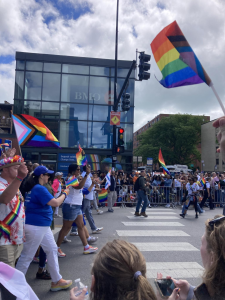A revolutionary end of year for many
November 19, 2019
It has been a revolutionary end to 2019 as the world has witnessed large protests emerge in Oct. across the nations of Iraq, Lebanon and Chile, and watch as protests in Hong Kong continue since March 2019.
Why are people protesting? And why should the rest of the world pay attention or care?
Iraq
On Oct. 1, the Iraqi people flooded the streets, demanding that their government deliver basic human rights to its people. The government responded by using force to oppress and silence the protests, cutting off 75% of the nation’s internet access. The government also attempted to hide the brutal violence governmental security forces have been imposing on peaceful protestors. According to CNN, as of Nov. 10, there have been more than 300 deaths and 15,000 injuries caused by tear gas, shootings and flash grenades.
Iraqi nationals are protesting because all they have is their voice to use. No one is helping the people. Protestors were drawn to the streets because of high poverty rates and violation of human rights. 60% percent of Iraq’s population is under 25. Youth unemployment is standing at 25%. College graduates have nowhere to go and many cannot find a job, due to lack of employment opportunities.
Since 2003, Iraqis have been living in turmoil without clean water and only a few hours of electricity a day. Issues such as these have lingered from the aftermath of the 2003 invasion of Iraq, the assassination of their leader Saddam Hussein in 2006 and the ISIS battle from 2014-2017. Iraqi land has been destroyed from the continuous violent state it has been in for all these years. ISIS military took over the city Mosul in Iraq, destroying many monuments of cultural heritage, including the bombing of prophet Jonah’s tomb from 700 B.C. The occupation also left thousands of Iraqis displaced and dead.
After the ISIS battle ended in Iraq, a new government was placed in May 2018. People turned to their new government to provide the rights they have been long waiting for, but the country just continued on the road of an economic crisis.
Iraq is one of the largest oil producers in the world, yet they rank 12th as the most corrupt country. The prime minister of Iraq did speak in early Oct., sending a message that he is with the people and does not want anyone to get injured from armed forces. However, the government did cut off 75% of internet access, as well as shut down many TV stations and have been violent towards journalists and protestors.
Lebanon
During the second week of Oct. 2019, wildfires that broke out throughout many villages in the mountainous regions of Lebanon. The government did nothing while the fires were spreading through residential and forest areas. Lacking large scale fire response equipment resources, Lebanon had to rely on Cyprus, a neighboring country, to help out by providing their firefighter helicopters. People were devastated and fed up from the lack of action the government displayed. While people were still recovering from the heartbreak of the fires, the government decided to implement a bill adding on monthly taxes to “Whatsapp” usage, which is illegal by WhatsApp. The years of struggle, stress and degrading political and economic climate led the people to the streets on Oct. 17.
Modern day Lebanon is in a fragile state, thanks to decades of turmoil such as the 1975-1990 civil war and the 2006 Israeli-Lebanese war. One million Syrian refugees came into Lebanon in 2012, overtaxing public sources. Lebanon had no president from 2014-2016, and a lapse in structural government resulted in a garbage crisis where garbage was not picked up for a year and a half in 2015. The struggles don’t stop there. There is a water shortage, unemployment and electricity is only provided a few hours a day. Politicians, the same ones who led the country into war between 1975-1990 are still in power. A lack of organized government, corruption and entrenched leadership are all reasons why the Lebanese people are protesting for government reform and new leaders to replace their current sectarian state.
On Oct. 29th the Prime Minister Saad Hariri resigned. On Tuesday Nov. 12, in a recent interview with the Lebanese President, Michel Aoun, he said, “If the people do not like the system and the people in the system, then leave.” His statement caused outrage especially since hours after his speech, a protestor got shot in front of his wife and 12 year old son. The scary part is not the protestors themselves, but those who oppose the protest and respond with violence, such as the police arresting protestors and those who implement violence on the streets often associated with political parties or a certain sect.
Chile
Once one of the most popular tourist destinations in Latin America, political unrest has taken a toll on Chile. The government of Chile imposed an increase in metro prices on Oct. 6 which triggered the Chilean people to protest on the streets. The demonstrations soon became riotous. In 2018, Oil prices increased and the prices of Chile’s main export, copper, decreased, which impacted the economy.
There is an inequality problem in Chile where the cost of living and debt are high, quality of healthcare and wages are low and there is a lack of a promising stable plan for retirement. Chile’s President Sebastian Piñera’s idea to decrease taxes on the wealthy seemed like a plan to increase their investments. That showed favoritism to the wealthy and inequality within its society.
Authorities responded to the protests by suspending the bill that started the demonstrations and President Peñera suggested a plan to raise taxes on the rich and raise wages. However, people are still on the streets and violence has increased. Police have been using tear gas and rubber bullets on the protestors and imposed a curfew on them as well.
Hong Kong
Ever since 1997, Hong Kong reclaimed its independence from Britain, to be a part of China again and granted the city to still have a semi-autonomous system. Even though Hong Kong is part of China, it has its own system. There is a difference in language, where 96 percent of the population in Hong Kong speak Cantonese. Whereas Mandarin is the official Chinese language. They also have a different money currency, the Chinese Yuan vs. The Hong Kong Dollar.
In Feb. 2019, the Extradition bill was proposed by Hong Kong’s government called the “Fugitive Offenders and Mutual Legal Assistance in Criminal Matters Legislation” amendment. People feared that if this bill were to be passed and revived, it would take away the semi-self-governed system that Hong Kong has. People protested until the bill got withdrawn in September 2019. However, protests are continuing, and have become very violent throughout, specifically between the police and protestors. At one point, protests paralyzed the Hong Kong airport. What started out as a peaceful protest turned violent. Not only throughout summer, but till now, many protesters were arrested, injured and even deaths have been reported. During the 70-year anniversary of the communist rule, it was one of the most violent days out of the protests. The government also imposed a new rule banning face masks that helped protect the protestors from tear gas.
Because Hong Kong’s semi-autonomous system provides rights such as freedom of assembly and speech, those laws will expire by the year 2047. Since the bill was withdrawn, their reasons for protesting has expanded for long term democracy for the next generations, release of prisoned protestors and for the police to be investigated.
As the people of Iraq, Lebanon, Chile and Hong Kong continue to protest in hopes of reaching their demands, it is only the beginning of their countries’ revolution.
It is important to be aware of the current events happening globally to expand one’s horizons and also helps people understand more about how certain countries’ laws and regulations operate.





